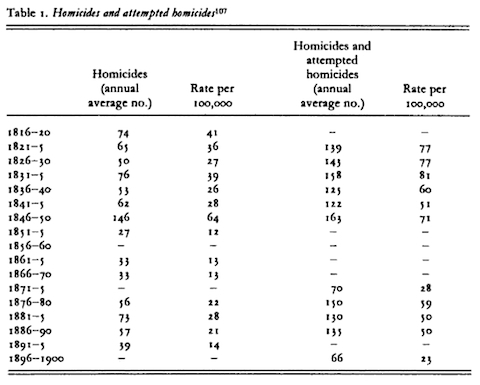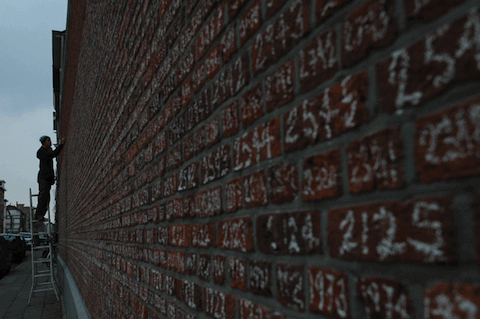Brendan I. Koerner's Blog, page 21
May 24, 2012
The Slip-and-Fall Queen

If the good folks at the National Insurance Crime Bureau are to be believed, the ol’ slip-and-fall con is thriving anew these days. Yet today’s practitioners of this tried-and-true scam are rank amateurs compared to Patricia Latham, who became a wealthy woman by perfecting the art of slip-and-fall. Her dedication to her craft was as deep as it was destructive, as this 1991 Orlando Sentinel article makes clear:
Using heavy rubber bands to bind her wrists and her son as a disguised witness to falls she staged, Patricia Latham was able to defraud insurance companies of thousands of dollars.
Latham, 59, a former Palm Beach and Broward County schoolteacher, her husband, Leroy, 62, and their son, David, 30, pleaded guilty on Thursday in Palm Beach County Circuit Court to swindling insurance companies…
The family’s confessions, which have yet to be made public, outline the drastic steps the family took to conduct the insurance schemes. Those steps included having David Latham physically harm his mother to make it appear she was injured during her staged falls. The couple also used their son as a backup witness in disguise, creating false names and establishing fictitious addresses for him to help support their claims.
The trio maintained during their confessions that a 1986 injury Patricia Latham sustained at a West Palm Beach McDonald`s restaurant was “a real slip and fall, but the injury started to heal too fast.” When Latham noted the quick healing of the hand she used to draw on classroom chalkboards, she did research. Through medical books, she found similar conditions.
When visiting attorneys, doctors or making court appearances, Patricia Latham would use her new medical knowledge to create a swollen hand. She wore sweat bands on her wrist, covering them with very tight rubber bands, for three to four hours before appearing.
After she was awarded $500,000 in the McDonald`s case, the family “intentionally went out” to look for “negligently repaired conditions” at restaurants and businesses. A poorly repaired carpet at Don Carter’s All- Star Lanes Ltd. in Boca Raton gave them their next target.
Once again, the sweat bands and rubber bands were used, but this time on both arms. “They had their son severely manipulate her hand to almost break it,” as they sat in a car in the bowling alley parking lot.
In 1988, Patricia Latham sued the bowling alley, but the lawsuit was dropped after insurance investigators filmed her using her hands during a trip to Walt Disney World.
Before her August arrest, Patricia Latham had fled from a San Diego courtroom. She was in the midst of a trial for a civil suit filed against a Kentucky Fried Chicken restaurant where she had staged another fall.
Yet Latham’s intelligence seems to have been of a very specific and devious nature, for she was a mess when it came to dealing with more ordinary aspects of life. Despite earning enough illicit money to live comfortably for many years, she wound up broke. I have to assume that Latham was less interested in the money than in the thrill of beating the system. We all have a desire to feel that we are not, in fact, at the mercy of circumstance. For Latham, her way of tasting that bit of human freedom was to pretend that she had broken her hands after slipping in a puddle of KFC barbecue sauce. To each her own.
May 22, 2012
The Corsican Glass is Half Full

As a tremendous fan of the French movie A Prophet—I defy you to find a flick with a better razor-attack scene—I was naturally drawn to this recent account of Corsica’s organized-crime problem. The French-run island sounds like it’s run like the Brooklyn docks circa 1952, with men of violence calling the shots at all levels. But that said, I had to pause and scratch my head upon reading this paragraph, which sort of undermines the whole article’s reason for existence:
Bozzi’s murder was the seventh of the 22 that disgraced Corsica in 2011 — a slow year compared to 2010 (40) and 2009 (44). In 2012, violence is already picking up. As of May, there have been nine killings.
First, if there have been nine killings as of May, the homicide pace hasn’t really picked up all that much. If the trend continues, Corsica’s year-end homicide rate will be just shy of 9 per 100,000 residents—high for placid Western Europe, of course, but well below that of most American cities with reputations for poor security. More important, couldn’t that homicide rate also be celebrated as progress? As the article itself notes, the number of annual killings has dropped in recent years. And as you can tell from the data above (taken from this fine tome), Corsica is a far less violent place today than in decades past.
Yes, Corsica has serious problems with organized crime and its attendant violence, many of which can only be addressed to solving the island’s political situation. But wouldn’t it be interesting to know why, exactly, the place has become safer over the years?
May 21, 2012
There is Hope for Us Yet
Slammed this Monday on business-y stuff—primarily trying to find a new tenant for the old Harlem headquarters. (Anyone in the market for a two-bedroom in a historic neighborhood? Holler.) Back tomorrow with something thoughtful; in the meantime, revel in the fact that some great humor does, in fact, translate across disparate cultures. So heartwarming that the Poles would dig Disorderlies.
May 18, 2012
The Economics of Bird Theft

I must confess to an undue fascination with bird theft, a crime too-seldom explored in the annals of popular literature. Though there is no shortage of stories about purloined finches, reporters never seem to explain how much the crooks stand to earn—or, more important, the mechanics of fencing illegally obtained birds. I was thus pleased to come across this account of recent swan-egg thefts in Florida, which flicks at the dollar amounts involved:
Forty swan eggs were stolen from nests on the shores of two lakes near downtown Lakeland, city officials said Friday. That’s double the 15 or 20 originally feared stolen since March.
The motive for the theft is believed to be money. Parks and recreation officials say an egg is worth $150 and a cygnet $300, so the thief or thieves could make up to $12,000, tops.
Digging a little deeper, I find that full-grown swans can retail for upwards of $3,500, a figure which would seem to substantiate the Florida officials’ estimates. It should be noted, however, that Cameroonian suppliers stand to roil the market with their cut-rate prices—though, granted, you need to factor in the probability of getting scammed when dealing with Yaoundé-based poultry farms.
May 17, 2012
Punished for Cleverness

Your daily reminder of why Belarus shouldn’t be hosting the 2014 World Hockey Championship:
A Belarusian opposition activist has been sentenced to 15 days in jail for using a sign to mock a plainclothes security officer.
In the April incident, Ivan Amelchanka was photographed standing next to a man who was using a hand-held camera to film an opposition-organized march in Minsk. The activist’s placard contained the word “Musorok”—a Russian slang word that can be translated as “fuzz” or “pig.” It also had an arrow pointing in the direction of the officer.
Amelchanka was technically found guilty of “hooliganism,” which I find both sad and uproarious. Perhaps the Belarusian judiciary should read Among the Thugs to develop a more solid understanding of what “hooligan” actually means.
May 15, 2012
“One Day It Might be Your Houses”
The last time we checked in with Carol Kidu, Papua New Guinea’s lone female legislator, she was proposing a bil that would set aside a percentage of parliamentary seats for women. Since then, she has become the head of the nation’s forlorn opposition, a role which has brought her into frequent conflict with PNG’s thoroughly corrupt elite. Three days ago, as the above video attests, Kidu’s activism brought her to the streets of a Port Moresby slum, where security services were bulldozing homes to make way for a shiny new development. Kidu asked only that the residents be permitted to gather their possessions before being evicted. But the men who do the government’s bidding wouldn’t hear of it.
Watch the whole video if you can. The situation spirals out of control at the 1:45 mark, which is right around when the bullets start flying. This is life in a country where the rule of law is mostly an illusion.
May 14, 2012
Never Say Die
On the road for much of today, so start your week off right with a little vintage King Kobra, the rare hair-metal band willing to sacrifice its hair for a worthy cause—in this case, the destruction of Commies. Louis Gossett Jr. kills it in this video, too.
May 11, 2012
Squished

I’ve been breaking out all my old kiddie books to read to Microkhan Jr., an experience that has taught me a lot about the formative images that shaped my worldview—sometimes to horrifying effect. One that jumped out at me the other day was from Richard Scarry’s Busy, Busy World. It purports to depict the demoralizing life of a Tokyo commuter, complete with those infamous subway pushers who cram salarymen onto the rush-hour trains. The Scarry drawing uses pigs instead of people, which makes for a disconcerting finished product—almost as if the passengers are being hauled to the slaughterhouse rather than office buildings.
As a result of that supposedly whimsical image, I developed a longstanding fascination with the travails (both real and imagined) of Japanese mass-transit users. Apparently I’m not the only one.
May 10, 2012
A Return to Normalcy

I dog-eared a whole bunch of pages in Mark Bowden’s Guests of the Ayatollah, including one featuring a passage about a longtime favorite topic: the psychology of captivity. I am a firm believer in the proposition that extended confinement can warp the mind in terrifying ways, which means I’m also a great admirer of men who manage to endure such torment. (Case in point.) Bowden briefly touches on a trick that such survivors employ, in his description of what Colonel Charles Scott discovered when cast into a cell where his fellow military officer, Colonel Thomas Schaefer, had recently been held:
Left alone, [Scott] found evidence that Schaefer had been in the room. It was lined with steel lockers and in one he found a slip of paper and a short pencil On the paper in handwriting he recognized as Schaefer’s—they had been passing notes for months—was a list of songs. Scott guessed that his air force colleague had been trying to memorize them. On another slip of paper was a rudimentary calendar, again in Schaefer’s handwriting. One of the lessons they had been taught in survival school was to keep track of time. From the scraps, Scott determined that Schaefer had been held in this freezing room for thirteen days, and that he had been moved three days earlier.
The ebb and flow of the days is something we rarely pay attention to, which is why time seems to march so quickly. But when you’re stripped of all freedom, keeping a running tally of the Earth’s rotation is one of the few ways you can exert some small measure of power. Amazing how little things like that can prevent the mind from unspooling.
(Image via Sam Hokins’ “The Seduction of Completion” project)
May 8, 2012
Black is White, Night is Day
There is, of course, no reason to expect anything but prevarication from the government of Azerbaijan, an authoritarian kleptocracy with no compunctions about employing dirty tricks. Still, the regime’s insistence on spouting obvious falsehoods is a dark wonder to behold. With its turn as Eurovision host fast approaching, Azerbaijan is going to great lengths to present a Potemkin village to the world, insisting that all is swell despite vast amounts of evidence to the contrary. Perhaps my favorite counterfactual claim of recent days, though, is this one:
Azerbaijani President Ilham Aliyev’s son-in-law, pop singer Emin Agalarov, has been confirmed as an act for Baku’s staging of Eurovision, the European Broadcasting Union’s annual pop blow-out, but a senior contest executive maintains that special interests did not play a role in the decision.
In a May 2 statement, the Eurovision.tv website announced that guest acts for the May 22-26 event “combine Azerbaijan’s music and culture and are a synthesis of national traditions and modern trends.” Along with the 32-year-old Agalarov, the Azerbaijan National Dance Ensemble, mugham singer Alim Gasimov and the band Natiq will also take part.
Agalarov’s inclusion, originally announced last month by the Moscow-based singer himself, had sparked criticism about favoritism. First Lady Mehriban Aliyeva heads the organizational committee for the event, which kicks off the day after the May 21 worldwide release of Agalarov’s latest album, “After the Thunder.”
But in emailed comments on May 3, Sietse Bakker, event supervisor for the Eurovision Song Contest 2012, maintained that “[t]he people who have proposed Emin as [an] interval act have only one interest: To make the best Eurovision Song Contest possible in Azerbaijan.”
If the Azerbaijani government was really intent on making the best contest possible, they might consider letting the nation’s opposition stage a public rally, as would be their right in virtually any other European nation.




